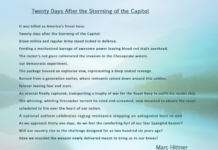The SIM Municipal Recycling Facility is located at 472 2nd Avenue Brooklyn, NY.
A B.O.E.M. “CALL” STARTED IT ALL
In 2018, the Department of the Interior’s Bureau of Ocean Energy Management (BOEM) published a ‘Call for Information and Nominations’ relative to developers interests to enter into commercial wind energy leases along the Atlantic continental shelf.
Existing Wind turbines are already a reality. Orsted operates its wind farm in the waters off Rhode Island. New Yorkers must brace themselves for the inevitable birth of wind turbines dotting the harbor and the offshore New York Bight. The Empire Wind project, awarded to Equinor, will begin construction of its wind farm in a 80,000 acre zone twenty miles south of the New York coastline between Jones Beach and the Rockaways. In fact, the SIM Recycling facility already has an operational wind turbine on its property, as does Bayonne New Jersey.
LOCAL BROOKLYN BENEFITS FROM A NEW FACILITY AT THE SOUTH BROOKLYN MARINE TERMINAL.
In the Autumn of 2018, the New York City Economic Development Corporation (EDC), Brooklyn Borough President Eric Adams breathed life into a drawing-board project to house a facility zoned to manufacture wind turbine parts in the Sunset Park industrial terminal. Equinor is anxious to move in as one of its ‘prospective tenants’ to this facility. Mayor Bill de Blasio is referring to it as the Sustainable South Brooklyn Marine Terminal (SSBMT). The terminal will become a training center to educate an estimated 250 port-related new hires and it will boost additional marine cargo and barge vessels to move bulk resources by sea. U.S. Representative Jerrold Nadler, whose office is in Sunset Park, stated this was “a momentous step in the revitalization of the Brooklyn waterfront and the first step in a phased development of the constructing a major deep-water container port centered at SBMT”.
NEW YORK’S COMMITMENT TO CREATE MEGAWATTS OF POWER
Last year, Edward J. Kelly, Executive Director of the Maritime Association of the Port of New York and New Jersey, referred to the BOEM Call Areas that dot the entire ocean span from the south of Cape Cod to New York Harbor as a heavily trafficked “regulated navigation area.” It comprises of six traffic lanes and three separation zones. Kelly asked BOEM to make the safety of marine navigation “the overriding factor when considering offshore development.” Collisions with other vessels or energy structures is his major concern.
Marine mammal migratory areas are also high on the list of adverse affects. Mammals already suffer from high frequency sound generation that has great consequences on their ability to navigate not to mention a disturbance to reproduction habits.
AD:
Custom progamming, database and system support
Best custom computer programming, database and system work. https://custom-software-usa.com Custom Software USA
